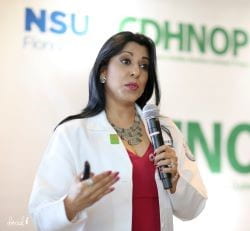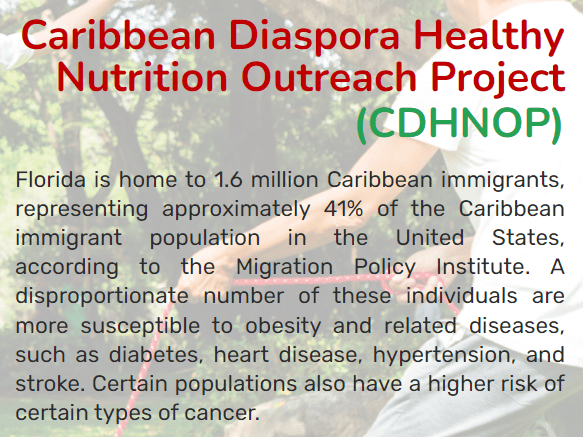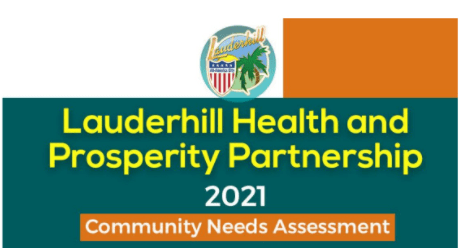$799K Office of Minority Health (DHHS) Award to Improve COVID-19 Health Literacy

 Dr. Farzanna Haffizulla, MD FACP FAMWA is an Associate Professor and the Chair of the Department of Internal Medicine in NSU’s Dr. Kiran C. Patel College of Osteopathic Medicine (KPCOM). Dr. Haffizulla (Principal Investigator) and her team at NSU were recently awarded $799K as part of a $3.5M grant to the City of Lauderhill from the Office of Minority Health (part of the US Department of Health & Human Services; DHHS). The grant is titled “Lauderhill Advancing Health Literacy to Enhance Equitable Community Responses to Covid-19.”
Dr. Farzanna Haffizulla, MD FACP FAMWA is an Associate Professor and the Chair of the Department of Internal Medicine in NSU’s Dr. Kiran C. Patel College of Osteopathic Medicine (KPCOM). Dr. Haffizulla (Principal Investigator) and her team at NSU were recently awarded $799K as part of a $3.5M grant to the City of Lauderhill from the Office of Minority Health (part of the US Department of Health & Human Services; DHHS). The grant is titled “Lauderhill Advancing Health Literacy to Enhance Equitable Community Responses to Covid-19.”
Tell me briefly about your recent grant-funded project.
In South Florida we have one of the largest Caribbean communities in the US. Despite that, many health education materials are not culturally tailored. This recently funded project from the DHHS Office of Minority Health is focused on advancing health literacy related to COVID-19, specifically looking at Caribbean groups in the City of Lauderhill, FL.
NSU’s team will serve as the program evaluators for this grant. We are working in sync with the City of Lauderhill and the Department of Health and Human Services to structure an evaluation and quality improvement plan that allows us to tease out “best practices” in advancing COVID-19 health literacy. In line with health equity in underserved communities, we have expanded the definition of “provider” from medical professionals to other trusted members of the community who provide health advice to city residents, such as barbers and salon workers. This ensures that they also have access to accurate, culturally-tailored health information to share with their clients and other members of their community.
Lauderhill Advancing Health Literacy to Enhance Equitable Community Responses to COVID-19 is designed to be a sustainable project that creates a health literacy policy that increases usability of clear and consistent public health information and services, provides access to accurate health information, and supports lifelong learning and skills to promote good health. Accordingly, the overall goals of the project are to reduce health literacy disparities among Lauderhill’s minority populations, increase COVID-19 testing and vaccination rates within the city, and increase healthy behaviors among Lauderhill residents. Given the needs that exist within Lauderhill, this project and its intended impact are particularly valuable to the city.
The City of Lauderhill, FL is in the top four of CDC’s Social Vulnerability Index (SVI), with high incidences of multiple health conditions. This coupled with many residents’ limited English proficiency have created inequities in health status and access to care. Lack of plain-language communication and accurate, easy-to-use information about COVID vaccinations, testing and preventative measures has increased the risk of individuals making unhealthy decisions, avoiding vaccinations, and embracing misinformation. Lauderhill residents need information they can understand and use to make informed decisions and take actions that protect and promote their health.
Given the potential value this project has for the city, it is important to evaluate its implementation and outcomes so that the project team can engage in quality improvement activities during the rollout of the work plan. We can also determine the ways and extents to which the project accomplished the outcomes it had in mind, and to share such findings with others interested in addressing health literacy and health equity in the midst of the COVID-19 pandemic or other public health challenges.
Who is working with you on this project?
We have a large team at NSU that will be supporting this work. Drs. Lucas Hollar and Kerriann Peart will serve as Evaluation Co-Leads along with myself. Dr. Raymond Ownby will serve as Co-Investigator for health literacy programming and evaluation. Dr. Maria Montoya will be Co-I for health literacy and cultural humility/competency. Dr. Christi Navarro will be Co-I for data collection and program evaluation. Drs. Josiah Alamu and Erin Biggs will be Co-Is for the collection and analysis of primary data Dr. Claudia Serna will be Co-I for health promotion/disease prevention and social marketing.
We also recently hired a Grant Coordinator and we are getting NSU public health students involved in the evaluation project as well.
We currently have job positions open for both student research evaluators and a data analyst.
How did you become interested in this work?
As a practicing Internal Medicine physician, I understand that health care needs go beyond the walls of a doctor’s office or health care facility, and as a researcher that it needs to involve significant work off campus and in the community.
When I was growing up in Trinidad, I saw my mother working as a nurse and my father as a business owner and teacher, and our lives were immersed in the community. We respected everyone’s role in making our neighborhood and society “work.” This is one of the reasons why, in my own projects and initiatives, I recognize the value and need to involve community partners to make a positive impact.
I also recognized the importance of magnifying the voices of our community rather than speaking on their behalf. Our research with the Caribbean community focuses on a community-based participatory model that taps into the richly diverse, culturally centered perspectives of our community residents. Translating this research data into meaningful programs and initiatives that are sustainable and adaptable aligns with my passion to promote disease prevention for all.
How does this project connect with your other work at NSU?
My work has always been with and in the community. In 2017 I was invited to join NSU as Assistant Dean for Community & Global Health in MD College. Around this time I applied for and was awarded an internal NSU Quality of Life (QOL) grant, which became the MD College’s first grant. This grant supported work to understand the Caribbean community’s preferences for health and wellness education and served as a valuable springboard for all the funded health equity projects and grants that I have been engaged in since. We created culturally-tailored materials and a cooking show for the community that are published online, www.NSUCaribbeanhealth.com.

I am grateful to work with such an incredible team of supporters. In fact, since joining KPCOM, Dean Elaine Wallace continues to be a champion supporter of our team’s health equity initiatives. With her support, we are now positioned to be leaders in health equity and inclusive health care that prioritizes diversity, empathy, and humanism. We are grateful to serve as a trusted source for health information for the Caribbean community.
I was approached by Aetna and CVS who embraced our continuously funded, Caribbean Diaspora Healthy Nutrition Outreach Project. They are now the official, exclusive sponsor to Season 2 of my Caribbean health cooking show, “In the Kitchen with Dr. H.” Using this platform, we are able to highlight small ways to make changes in the way we eat and live that can prevent chronic diseases such as diabetes, heart disease and stroke. Recently, I was invited to serve as a guest alongside Vice Mayor Dunn on Dateline, hosted by Dr. Lippman. Feel free to view this show to learn more about this work.

Since becoming the Chair of Internal Medicine in KPCOM in August 2020, I was asked by the City of Lauderhill to Co-Chair the Lauderhill Health & Prosperity Partnership (LHPP), working directly with city officials who founded this initiative Vice Mayor Melissa Dunn and City Manager Giles-Smith. We are also working with city residents, community stakeholders, business owners and other key city officials like Mayor Thurston and the city commissioners as we take a data-driven approach to addressing community needs. This role has allowed NSU to serve as an anchor institution for this city initiative.
The Caribbean Diaspora Healthy Nutrition Outreach Project provided a population health platform to gather social determinants of health data and other relevant health metrics from City of Lauderhill residents. Together we worked to produce a comprehensive community needs assessment. This is now published on the city’s website, and we are currently working on a publication related to our findings that will include both qualitative focus group and quantitative survey data related to social determinants of health and disease metrics such as diabetes risk, cancer diagnosis, heart disease, mental health, and COVID-19 challenges, among other health topics.

What advice do you have for other grant seekers at NSU?
My prior community-based participatory research provided the platform—including partners, infrastructure, pilot data, and community trust—for the newly-awarded Office of Minority Health grant. It takes a lot of effort to become engaged and integrated with, as well as trusted by, the community and its many stakeholders. It has been especially challenging during the pandemic, but nonetheless is essential to the work I do.
My advice is to keep following your passion, including how your work can be accomplished by working with individuals off campus and outside your field, such as policy folks, city stakeholders, and business owners. Get involved in organizations that are community-centered, serve on leadership committees to make new professional connections to gain a wider view of current issues, and embrace any opportunity to infuse more expertise and support into your work.
You need to become an ambassador for your work. I have found creating websites, materials, and an information portal for potential supporters and collaborators to access as they consider getting involved in my team’s work to be helpful. That’s actually how I secured funding for the second season of my health-focused cooking show.
All of this work aligns with NSU’s core values of Community and Diversity, and I advise you to take advantage of the resources and support available in your college (especially through your Dean), TRED, and the Levan Innovation Center.
What is the next project on your agenda?
I am on a mission to improve health equity, promote disease prevention, and address health disparities. In serving as a Physician-Scientist Board Member for an independent Institutional Review Board (IRB) for the past 10 years, along with other positions I hold in national initiatives and associations, I have developed a broader understanding of where healthcare is falling short in treating communities of color. It has made me even more aware of the lack of representative study designs in the biomedical field that contribute to this problem.
For example, data on cancer disparities does not fully capture the diversity of patients, especially in minority communities. Members of the Caribbean community are often categorized as “Other” in studies because we are multi-racial. Furthermore, many studies do not even include minority community data. These are missed opportunities to characterize disease risk and the role of different variables for distinct patient populations. The downstream effects of this lack of actionable data and an understanding that it is vital to capture the diversity of our community in research, is that science and medicine magnify disparities in chronic disease and adverse events for minority groups.
I hope for myself, as well as for other researchers, to become more deeply involved in the national conversation and initiatives to look at health equity from a different angle. One where we, along with leaders from different backgrounds and settings, come together and harness trust and influence of community members to serve as health advocates in minority communities.